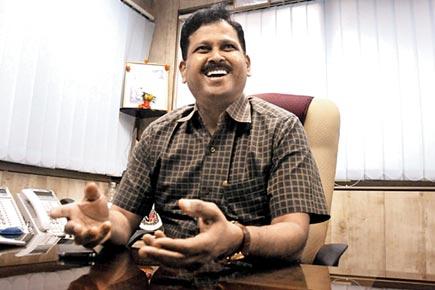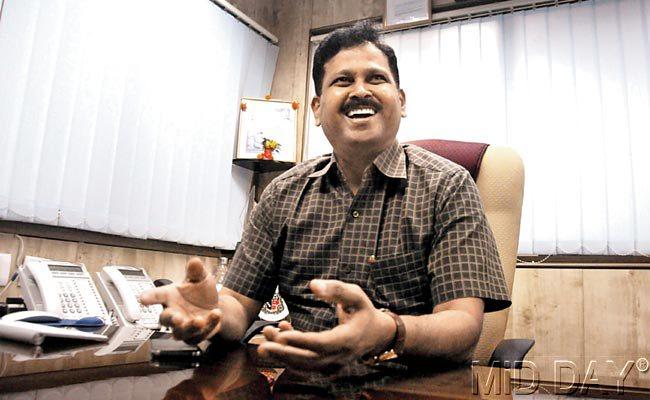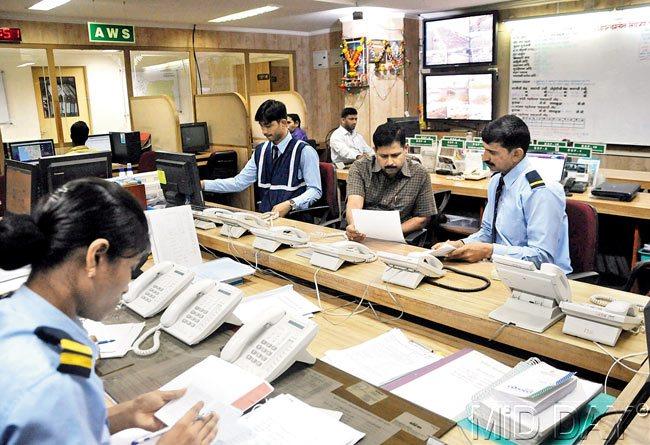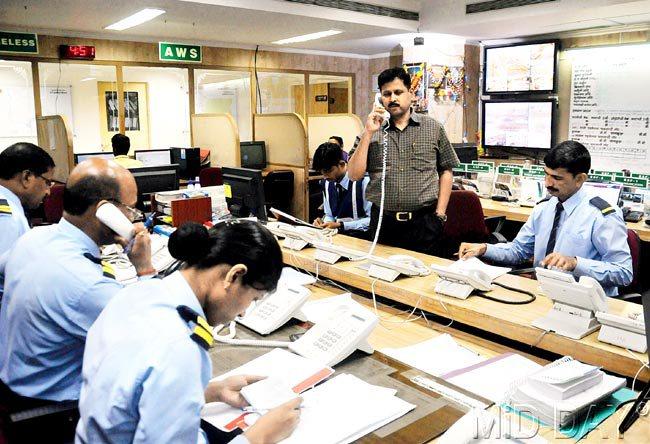Mahesh Narvekar, Chief Officer, Disaster Management Cell, BMC, talks about why every citizen's life is precious to him and how he dreams of making Mumbai a disaster-resilient city and more in a candid chat

As a child, Mahesh Narvekar, now chief officer of the disaster management cell of the Brihanmumbai Municipal Corporation (BMC), loved the rains. He would visit the beaches with his friends and watch raindrops fall on the windowpane of his house with rapt attention. Now he wakes up in the middle of the night to see if the sky is overcast and watches satellite images whenever he is free. On a Monday evening when I meet Narvekar, who has been heading this cell since 2008, at the municipal headquarters, he tells me, “Now my neighbours complain to me about pothole-ridden roads. I have developed a phobia of monsoon.”
Mumbai monsoon special: Reign in the rains

Mahesh Narvekar is high on life and motivates his team members with his witty repartees. Pics/Satyajit Desai
Understandably so, since every year the BMC has to face public wrath, thanks to pothole-ridden roads and water clogging. But over the course of time, Narvekar has learnt to take it in his stride. He says, “Working in the disaster management cell is a tough job. I’m the one point contact for senior civic officials, so I always have to be alert. My first year in this department was terrible. I started asking myself if I should continue. But I have been learning on the job.”
Narvekar’s department has to be on high alert as they address varied disasters, including fire, tree falls, flooding and terror attacks, etc. During his six-year tenure, his team has tackled major events such as the 26/11 terror attacks, serial bomb blasts at Zaveri Bazaar (2011), fire at Mantralaya (2012), Naval Dockyard (2013) and Behrambaug (2013). He says, “My team members have to maintain their calm while addressing distress calls from citizens. They need to take down proper details such as the location, extent of disaster and ensure that assistance is provided immediately. If they don’t do so, then the disaster will be aggravated.”

(Above and below) The hands-on boss is seen here at the control room of BMC’s disaster management cell. Pics/ Satyajit Desai
Narvekar, a Science graduate from National College, Bandra, joined the BMC 23 years ago. Starting off as a security officer he climbed the ladder and was a protocol officer before heading the disaster management cell. “The biggest similarity between my earlier profile and current profile is that both involve co-ordination. There are 38 types of disaster. Every resource is different. One needs to make the right call about which resource needs to be mobilised where,” he explains.
Ask him what motivates him to handle this high-pressure job and he says, “We are instrumental in saving people’s lives. During the high tide on June 8 this year, we deployed fire brigade on all the beaches and there wasn’t a single death in the city. Last year, with the help of other agencies such as the police etc, there wasn’t a single death on the beach and we rescued 35 boys. This gives me satisfaction.”
It’s easy to presume that he hates the monsoon, but he says, “I’m worried when it doesn’t rain. Last year by this time, Mumbai had received 40 per cent of rainfall. This year, we have received just one-two per cent. This is a cause for concern.”

Narvekar’s passion for his job is apparent when he tells me that last year, he completed his postgraduate diploma in disaster management from Indira Gandhi National Open University (IGNOU). He says, “It’s my dream to make Mumbai a disaster-resilient city. We are working towards it by setting up the city’s first institute of disaster management at Parel. It will start operations in the next six months or one year. The institute will provide first responder training to schools, colleges and non-government organisations.”
Shouldering this huge responsibility takes a toll on Narvekar’s personal life but he admits that he gets ample support from his wife, an Air India employee and daughter, who is completing her final year of MBBS. The Ganesha devotee, who has been visiting the Siddhivinayak Temple at Prabhadevi since the last 25 years says, “We usually talk more on the phone. All three of us hardly meet. But when we do, we spend quality time together.”
 Subscribe today by clicking the link and stay updated with the latest news!" Click here!
Subscribe today by clicking the link and stay updated with the latest news!" Click here!







